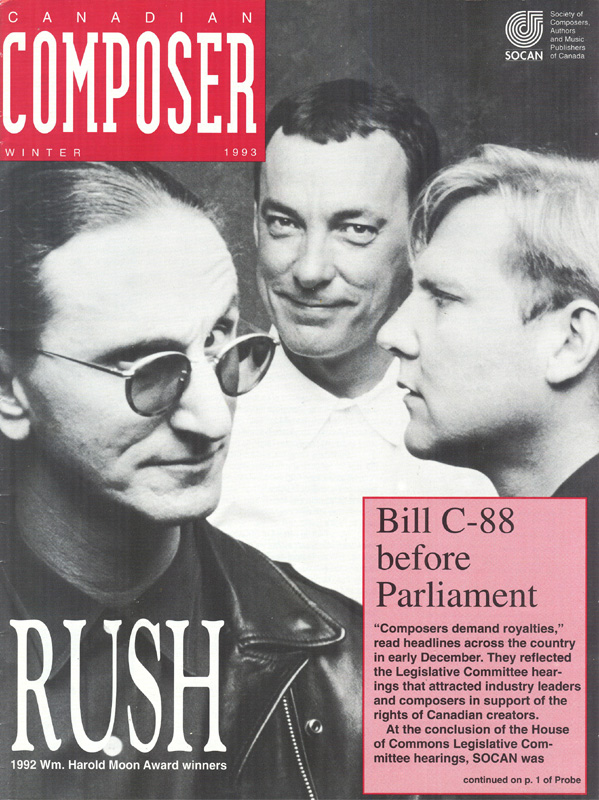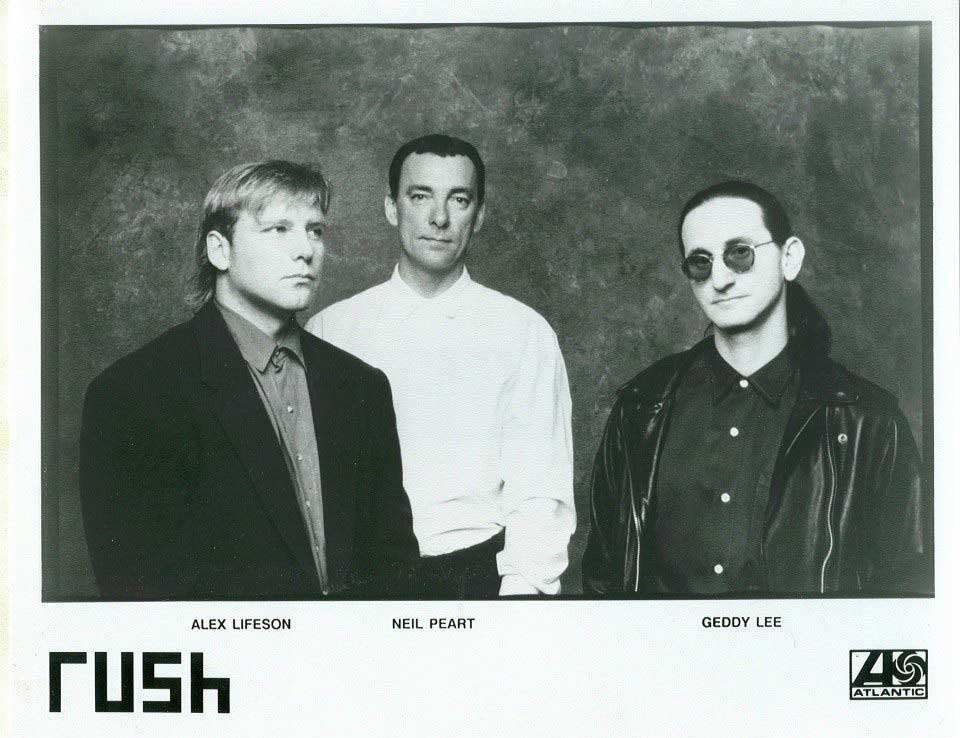Rolling Bones Gather No Rust
By Dave Bidini, The Canadian Composer, Winter 1993, transcribed by John Patuto

From a 1992 press release: "In the annual Superbowl of Rock, [Los Angeles radio station] KLOS asked listeners to vote for their four favorite bands of all time. This past weekend it was narrowed down to two finalists-Rush and Led Zeppelin. Voting was tabulated Sunday and the final results were: Rush, 4,025 votes; Led Zeppelin, 3,800 votes. Congratulations to Rush, also successive winners at KLOL in Houston [Tex.]."
Bigger than Zep
That's almost like being bigger than Jesus (apologies to John Lennon). Just take a look at these stats: 30 million units sold worldwide, 18 albums, 500 shows in a dozen countries to six million fans, double, triple platinum, ad nauseum record sales. But for more crystalline souls, numbers aren't the whole story: over the past ten years, both Geddy Lee and Neil Peart have consistently placed among the top three in best-of derbies in musician magazines; the band's policy of performing for benefit organizations from the United Way to the American Foundation for AIDS Research is peerless; the trio was voted Group of the Decade in Canada in 1990 by Canadian music industry representatives; and last October the band won SOCAN's prestigious Wm. Harold Moon Award "for bringing the international spotlight upon Canada through their music."
That said, Distinguished Achievement Awards match this band like snow and winter. If CanRock has its summit, then the executive council meets at Rush's place - lots of oakwood and stereo, a big opulent bong in the middle of the meeting room. The band's career has been considerably different from the mainstream: more than just a lipstick-stained tour program, worthy instead of a nice, leather-bound dossier, with leaves of paper printed in an elegant old typeface - stories with a look for the ages from a band of our lives.
Different indeed.
While the Rush members spent the greater part of their infancy nesting high atop the progressive-rock landscape among the Xanadus and Kubla Khans - "Fly By Night," "Closer to the Heart" and "Temples of Syrinx" too - they never went so far into their own minds as to stunt their growth, thriving instead on the anti-rock 'n' roll process of hitting a creative vein while aging and maturing. Most bands slow down and get tired as they get older, but not Rush, who did the opposite and wrote vibrant, punk-inspired songs about mall life during the trio's latter years. For Rush, middle-age begat vitality and self-awareness, and their spacey hard-rock, which had once edged perilously close to cliché, suddenly grew privy to a renaissance so right and good and honorable it was as if Frank Capra had directed a sequel to Spinal Tap.
When I asked drummer Neil Peart about this phenomenon, even the all-knowing Professor was stumped.
"We're like a satellite. We're just a little ... over here," he said.
Roll the Bones Tour Program: "Being mature doesn't have to mean being dead. You just have to get out there and rock, keep your bones rolling and stay out of the ruts. That has been true for Rush as well: we have continued to learn and grow and change, but behind all that the important thing was just to keep moving: Rolling bones gather no rust."

"We are certainly dedicated to this thing," says Peart from his home office in Toronto. "I think if we were to get corporate sponsorship, or a really asinine, sexist song, or maybe some big hair, a good part of our audience would walk out. Over the years sectors of our audience have come and gone - maybe we've changed away from them, or vice versa - but they know that if they come back, they're gonna find somebody that's still doing what they did, playing what they like to play. It might be weirder, whatever, but they'll always be able to find that point of access and say, 'Well, this is still the soundtrack of my life,' which is the nicest compliment I've ever got from someone who is a longtime fan."
Fan base changing
Rush fans used to be easy to find in a crowd: pimply complexion, denim jacket, calloused fingers, copy of The Fountainhead under one arm, a Hemispheres songbook under the other - but that's no longer the case. American alternative acts Primus, Living Colour and the Afghan Wigs, and Canadian bands from the Barenaked Ladies to Change of Heart, have mentioned Rush among their musical motivators. Scanning a Rush show circa 1992 reveals a cross-section of young and middle-age men and women, a more diverse crowd than ever before.
"You hope the things that move us will be the things that move other people, whether they're writers or scientists or set designers," says Peart. "A lot of times I've written about being ambitious, going for the gold, this blind sense of ambition - that we can do it, that we can all do it - an inspirational, idealistic approach; but on a song like 'Bravado' (from Roll the Bones), it was the first time we addressed the idea of setting a goal and not achieving it. Perhaps it's this ever-changing reality that brings more and more people in. The process of changing innocence into experience is something that Rush is always going through, and to see people relate to that is an amazing thing. It's about learning. We're all learning still, aren't we?
"I don't know what to think if you'd have told me 20 years ago where Rush would be today. I mean, for me, I just wanted to be good. I only realized a few years ago that I can actually play this thing - this drum kit - because most of my time was taken up just trying to improve, to be good, to get good, whatever. See, I think there comes a time in every musician's life - I know the three of us have gone through it - where you have to decide whether you're going to take the path to try to survive and 'make a living' by playing music, or you're just going to do what you do and do it well, and hope that people catch on. Well, at this stage, we're lucky that people have caught on. A lot of musicians fall through the cracks, some by choice, some not. Often you can't tell why you've been led down one path or another; often it just happens, quite early on in life, and you don't know what hit you. I'm lucky - we're lucky - that we always knew what path we wanted to take. You can't underestimate how fortunate you really are until you can sit back and reflect on it. Even then it's pretty tricky trying to figure out why and how it's turned out this way."
"Rush Rool, o.k.?"
It's easy for many of us to say: Roll the Bones. This is also easy to say: RUSH ROOL, O.K.? But the reality among music lovers throughout most of Canada is that Rush never hurt anybody, and that's lovely; however, umm, I beg your pardon, they're not a national treasure you know, not like Gordon Lightfoot or Bryan Adams. Instead, this great Toronto institution is regarded as something other-worldly by our culture-makers; the Canadianness of "Subdivisions," for instance, isn't written about in the same breath as "The Wreck of the Edmond Fitzgerald," but it should be. Like a lot of art considered lowbrow, Rush is still considered too ham and eggs for the pundits programming the entertainment up Parliament Hill way.
Still, my Canada includes Rush.
"No, we're not represented as a 'Canadian Band' the way others are," Peart admits. "But still, we live here, our friends are here, we work here. I consider myself nearly a Quebecker. That's my home really. But when you travel abroad, those aren't your concerns, to prove to people, to audiences that you are a Canadian. I mean, you just are, aren't you? When I was cycling through Mali [in west Africa, last year], I was travelling with some Americans who kept saying 'What?' whenever they didn't understand what each other was saying. That bothered me. I thought it was rude. I kept thinking to myself, say 'I beg your pardon,' or 'Excuse me.' Now that's Canadian. Every now and then you get little reflections of why you are who you are because of the place you come from. That's how I draw my character as a Canadian. That's enough, isn't it?"